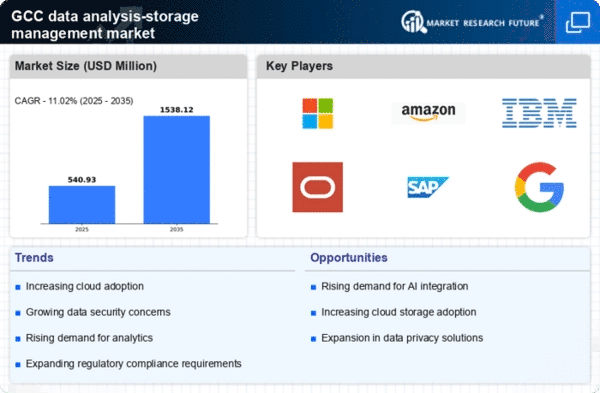The data analysis-storage-management market is currently characterized by intense competition and rapid innovation, driven by the increasing demand for data-driven decision-making across various sectors. Key players such as Microsoft (US), Amazon (US), and IBM (US) are strategically positioned to leverage their technological advancements and extensive resources. Microsoft (US) focuses on integrating AI capabilities into its Azure cloud platform, enhancing data analytics and storage solutions. Amazon (US) continues to expand its AWS offerings, emphasizing scalability and flexibility, while IBM (US) is investing heavily in hybrid cloud solutions, aiming to provide comprehensive data management services. Collectively, these strategies contribute to a dynamic competitive environment, where innovation and customer-centric solutions are paramount.
In terms of business tactics, companies are increasingly localizing their operations to better serve regional markets, optimizing supply chains to enhance efficiency. The market structure appears moderately fragmented, with a mix of established players and emerging startups. This fragmentation allows for diverse offerings, yet the influence of major companies remains substantial, shaping market trends and customer expectations.
In October 2025, Microsoft (US) announced a significant partnership with a leading regional telecommunications provider to enhance its cloud services in the GCC. This collaboration is expected to improve connectivity and data accessibility for businesses in the region, reinforcing Microsoft's commitment to localizing its services and expanding its market share. Such strategic alliances are crucial for enhancing service delivery and fostering customer loyalty.
In September 2025, Amazon (US) unveiled a new suite of AI-driven analytics tools within its AWS platform, aimed at optimizing data storage and management for enterprises. This move not only strengthens Amazon's competitive edge but also reflects the growing trend of integrating AI into data solutions, enabling businesses to derive actionable insights more efficiently. The introduction of these tools is likely to attract a broader customer base seeking advanced analytics capabilities.
In August 2025, IBM (US) launched a new initiative focused on sustainability in data management, promoting energy-efficient storage solutions. This initiative aligns with global trends towards environmental responsibility and positions IBM as a leader in sustainable practices within the data analysis-storage-management market. By prioritizing sustainability, IBM is likely to appeal to environmentally conscious organizations, enhancing its brand reputation and market presence.
As of November 2025, the competitive landscape is increasingly defined by trends such as digitalization, sustainability, and AI integration. Strategic alliances are becoming more prevalent, allowing companies to pool resources and expertise to enhance their offerings. Looking ahead, competitive differentiation is expected to evolve, shifting from price-based competition to a focus on innovation, technology, and supply chain reliability. Companies that can effectively harness these trends will likely secure a stronger foothold in the market.

















